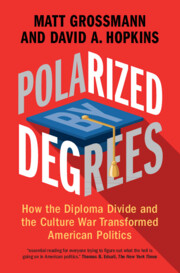2 results

Polarized by Degrees
- How the Diploma Divide and the Culture War Transformed American Politics
-
- Published online:
- 05 September 2024
- Print publication:
- 05 September 2024
4 - The Rise of the Diploma Divide in American Elections
-
- Book:
- Polarized by Degrees
- Published online:
- 05 September 2024
- Print publication:
- 05 September 2024, pp 121-161
-
- Chapter
- Export citation

